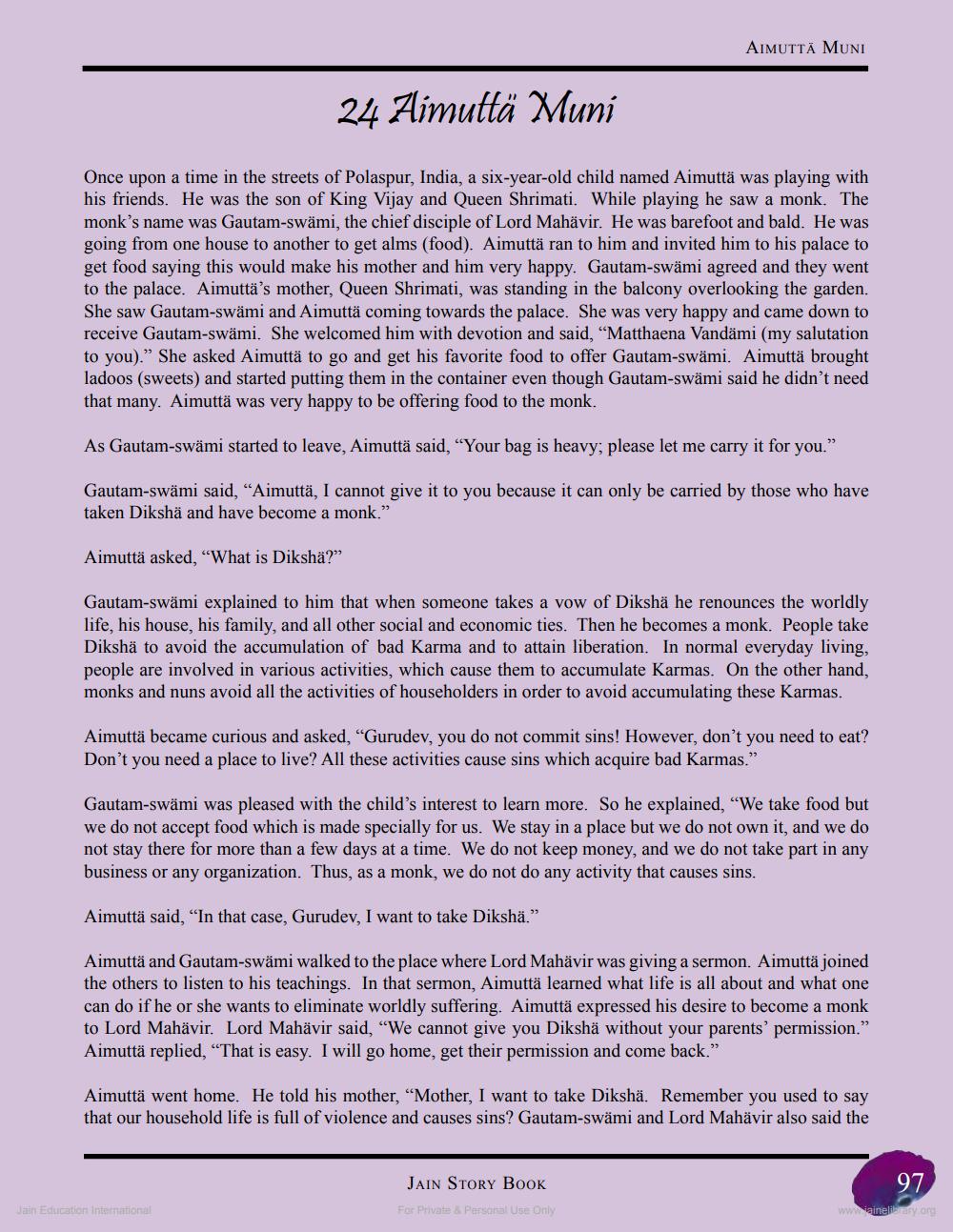Book Title: Aimutta Muni Author(s): JAINA Education Committee Publisher: JAINA Education Committee View full book textPage 1
________________ AIMUTTĀ MUNI 24 Aimuttä Muni Once upon a time in the streets of Polaspur, India, a six-year-old child named Aimuttä was playing with his friends. He was the son of King Vijay and Queen Shrimati. While playing he saw a monk. The monk's name was Gautam-swämi, the chief disciple of Lord Mahävir. He was barefoot and bald. He was going from one house to another to get alms (food). Aimuttä ran to him and invited him to his palace to get food saying this would make his mother and him very happy. Gautam-swämi agreed and they went to the palace. Aimutta's mother, Queen Shrimati, was standing in the balcony overlooking the garden. She saw Gautam-swämi and Aimuttä coming towards the palace. She was very happy and came down to receive Gautam-swämi. She welcomed him with devotion and said, "Matthaena Vandämi (my salutation to you)." She asked Aimuttä to go and get his favorite food to offer Gautam-swämi. Aimuttä brought ladoos (sweets) and started putting them in the container even though Gautam-swami said he didn't need that many. Aimutta was very happy to be offering food to the monk. As Gautam-swämi started to leave, Aimuttä said, "Your bag is heavy; please let me carry it for you." Gautam-swämi said, "Aimuttä, I cannot give it to you because it can only be carried by those who have taken Dikshä and have become a monk." Aimuttä asked, "What is Diksha?” Gautam-swämi explained to him that when someone takes a vow of Dikshä he renounces the worldly life, his house, his family, and all other social and economic ties. Then he becomes a monk. People take Dikshä to avoid the accumulation of bad Karma and to attain liberation. In normal everyday living, people are involved in various activities, which cause them to accumulate Karmas. On the other hand, monks and nuns avoid all the activities of householders in order to avoid accumulating these Karmas. Aimuttä became curious and asked, "Gurudev, you do not commit sins! However, don't you need to eat? Don't you need a place to live? All these activities cause sins which acquire bad Karmas." Gautam-swämi was pleased with the child's interest to learn more. So he explained, “We take food but we do not accept food which is made specially for us. We stay in a place but we do not own it, and we do not stay there for more than a few days at a time. We do not keep money, and we do not take part in any business or any organization. Thus, as a monk, we do not do any activity that causes sins. Aimuttä said, “In that case, Gurudev, I want to take Dikshä." Aimutta and Gautam-swami walked to the place where Lord Mahävir was giving a sermon. Aimuttä joined the others to listen to his teachings. In that sermon, Aimuttä learned what life is all about and what one can do if he or she wants to eliminate worldly suffering. Aimutta expressed his desire to become a monk to Lord Mahävir. Lord Mahävir said, "We cannot give you Dikshä without your parents' permission." Aimuttä replied, "That is easy. I will go home, get their permission and come back." Aimuttä went home. He told his mother, "Mother, I want to take Dikshä. Remember you used to say that our household life is full of violence and causes sins? Gautam-swämi and Lord Mahävir also said the 97 JAIN STORY BOOK For Private & Personal use only Jain Education inte national ww.aineirasyonPage Navigation
1 2 3 4
